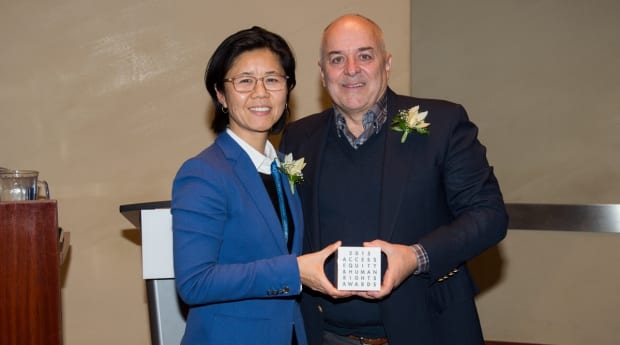The City of Toronto recognized longtime Pride Toronto volunteer Mark Smith on Dec 2, 2015, for his work with LGBT arts culture.
As part of City Hall’s Access, Equity and Human Rights awards, Smith was granted the Pride Award for Lesbian, Gay, Bisexual, Transgender, Transsexual and Two Spirit Issues.
Along with his work at Pride Toronto, where he has been a two-term entertainment director and three-term board member, Smith has been a part of the production of the Kumbaya Festival for People Living with AIDS, #endhatelaws, and the Pride Coalition for Free Speech.
“Under Mark’s guidance, he has enhanced the arts and culture presence at Pride Toronto to ensure that Pride Toronto has become one of the most premiere, internationally recognized Pride events globally,” said Councillor Kristyn Wong-Tam, who presented the award to Smith.
Melleny Melody, better known as Juno-nominated Melleefresh, echoed Wong-Tam’s sentiments. “[Pride used to be] on its own little island on Church Street and over the years it got bigger and bigger,” she said.
Melody was just one of the people who nominated Smith for the award. Other supporters include trans rights activist Susan Gapka, and activist and journalist Andrea Houston who works as MPP Cheri DiNovo’s executive assistant.
“We like to award people who are always front-and-centre,” Houston said of the nominations. “But we often forget about the people who make such a difference in the background.”
As well as his work in expanding Pride Toronto’s arts and culture, Smith is credited with the creation of the now popular fringe spaces during Pride, including the Freezone, which has evolved into the Clean, Sober and Proud space in conjunction with the Centre for Addiction and Mental Health. He also spearheaded the Alternaqueer space, and was involved with the creation of the Abilities Viewing zones on the parade route, which allows people with physical disabilities to fully enjoy the Pride parade.
Smith explained how some of his feelings on inclusion and diversity have changed over time.
“I was actually, for many years, very much against the growing alphabet,” he said. “I thought [the LGBT acronym] should be within the clinical confines of lesbian, gay, bisexual, transgender.”
“[But] when you exclude somebody, the whole process becomes meaningless,” he added.
“Including more letters and increasing the alphabet gives those people a place to identify with.”

 Why you can trust Xtra
Why you can trust Xtra


